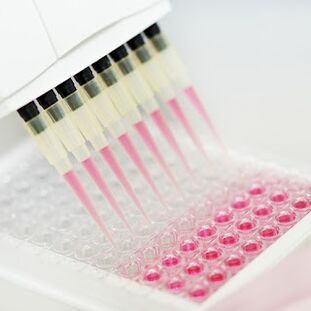In the human body, many species of helminths can parasitize, so there are various tests to detect them. Each diagnostic event has its own percentage of reliability and is characterized by certain performance characteristics.
In the human body, many species of helminths can parasitize, so there are various tests to detect them. Each diagnostic event has its own percentage of reliability and is characterized by certain performance characteristics.

Fortunately, unique techniques have been developed to detect parasite infestation at an early stage and start treatment on time.
What tests will you need to pass to detect worms?
To determine the presence of parasites, one analysis is not always enough, because at different stages of development worms manifest themselves in their own way.
The main types of analysis are distinguished:
- Preventive. Allow the timely detection of helminthiasis. This can be done even in the absence of typical symptoms. It is recommended that the survey be conducted annually.
- Barrier. Reducing the risk of spreading parasites among the population. It is considered mandatory upon receipt of a medical record.
- By prescription. Tests are given if there are characteristic signs of helminth infestation: nausea, itchy anus, abdominal pain and fatigue.
To determine the exact presence of worms, you will need to pass several tests. In addition, some of them pass several times.
Stool analysis for parasites
Stool analysis is the simplest analysis done in any district clinic. The results show the presence of worm eggs in the feces. It contains helminth eggs.
Older individuals can lay thousands of eggs a day. Some of them spread through the blood throughout the body. But, fortunately, most come out naturally.
In order for the analysis to be reliable, it is necessary:
- You have to go up to 3 times. This is because the risk of a healthy person swallowing eggs is high, although this does not mean that he will become infected immediately.
- Kal is given every 7 days.
- Stools are taken from different places.
It is not necessary to collect material in the morning, this can be done in the evening, but can be stored no more than one day and in a cool place.
If a large number of eggs are found during the test, no other analysis is required.
Complete blood count for worms
Such a study is known to all from childhood. Blood is usually taken from a finger, but sometimes from a vein. The study will quickly determine the cause of each disease.
Usually one does not suspect that there are worms. That is why it is important for your doctor to learn about the symptoms that are characteristic of the infection.
This analysis is able to:
- Determine the cause of the symptoms.
- Detect the presence of parasites in the blood.
- Confirm the presence of other pathologies.
There is a misconception that helminths live only in the gastrointestinal tract. In fact, many species, once they have penetrated the stomach, then penetrate the bloodstream and spread throughout the body. This is not without serious consequences. The parasites leave a trail that doctors find in the blood.
Chemotest
Finding information about this study is not easy, and the term itself is not familiar to many. In fact, for the patient, this is a procedure for donating blood for general analysis. Differences in laboratory tests themselves.
The task of the chemotest:
- Determining the immunity of any products of the body.
- What is the reaction to them.
This test is usually prescribed by a doctor. Hemotest is able to detect parasites that cannot be detected otherwise. This study is considered the most reliable.
Various manipulations are performed on the patient's blood. It is influenced by biological and chemical substances, observing the reaction. It is different, and some indicate the presence of helminths.
Such a test is quite complex and is not performed in every clinic. The result is known after 2-5 days. In the presence of parasites, the test will give a positive reaction.
PCR analysis for worms
This diagnosis is considered an accurate and modern research method. PCR analysis is able to detect the presence of bacteria, intracellular parasites and viruses. Blood and other body fluids are taken for analysis. If worms are suspected, then the stool is used for testing.
The detection of even a few fragments of the parasite's DNA in the biomaterial indicates helminthic invasion. PCR analysis is quite simple, the result is known after a few hours. This is facilitated by the use of special equipment. With this test you can not conduct many additional studies, but quickly get the desired result.
Unfortunately, not every clinic has such equipment, and the cost of this analysis is quite high.
ELISA blood test for worms

The most popular and reliable analysis today, experts call the enzyme immunoassay for parasites.
The main purpose of this high-precision laboratory method is to detect antibodies against a certain type of parasite in the blood. Immunoglobulins (also called antibodies) are a natural response of the immune system and are designed to neutralize the negative agent.
Enzyme-linked immunosorbent assay (ELISA) shows a change in antibodies in the blood. Research is great for identifying parasites.
It is divided into 2 stages:
- immune system reaction. It can connect molecules, microorganisms and cellular elements to be detected.
- enzymatic reaction. You can visually evaluate the results of the reaction.
Serological blood test
With the help of this laboratory method, infectious diseases are detected, as well as the stages of their development.
This test allows:
- Determine the patient's immune status. When infected with parasites, the immune system is significantly weakened.
- Detects the presence in the blood of bacteria that have caused a decrease in immunity.
By the way, this test is used to determine blood type.
Blood test for Giardia
This analysis is considered to be of the highest quality. It consists of an enzyme-linked immunosorbent assay. The assay determines the density of antibodies against worms of a given species.
When infected, IgM antibodies appear in the blood, and after 2 weeks - IgA and IgG.
The results of the study show Giardia infection up to 95%.
This analysis is also prescribed to evaluate the effectiveness of treatment. If the number of parasites decreases, then the method of recovery is chosen correctly.
scraping
A smear is taken to diagnose enterobiosis, ie the presence of pinworms in the body.
Scraping is done in the following ways:
- Using a special spatula or plain cotton swab.
- Using adhesive tape.
This test is considered more effective than a regular stool test. It can be done alone or in the clinic. You need to take a cotton swab or tape and make a smear in the anus.
Do not wash before the procedure. If scraping is done at home, a spatula or adhesive tape (glued to the glass) is placed in an airtight container and taken to the laboratory. For a more accurate result, the analysis is given several times.
When and where should I be tested for worms?
Parasite tests should be taken for obvious symptoms of helminth infestation: Asthenia, digestive problems, sudden weight loss and dermatological diseases. In addition, the diagnosis of helminths is necessary in situations where a person has been treated for a chronic disease for a long time and no recovery occurs. Often the pathology is provoked not by physiological problems, but by the presence of parasites in the body.

Tests are mandatory for the following symptoms:
- Itching in the anus.
- Dysbacteriosis.
- Excessive salivation.
- Pale skin.
- Urinary incontinence.
- Constipation leading to diarrhea.
- Abdominal pain with different localization.
- In women, the menstrual cycle is disrupted.
The analysis is given:
- at the district clinic.
- In a medical research laboratory.
- In a private clinic.
The main thing is that the medical institution has the necessary equipment and qualified staff.
What tests are done to detect parasites?
In principle, one analysis is sufficient to detect worms in the body.
It is recommended:
- Spend mud.
- Scrape.
Verification of these analyzes is performed quickly. In most cases, they are sufficient to identify parasites. Sometimes a blood test is prescribed, but this procedure is more complicated, painful and expensive.
Interpretation of the results is performed by the attending physician. Based on the indicators, the specialist makes the final diagnosis and chooses a therapeutic program.
Preparation for worm detection tests
It should be noted that no special training is required. But there are some guidelines and limitations.
They are as follows:
- Before passing the test, it is necessary to eat mostly snacks or refuse it altogether.
- You must stop taking the medicine 3 days before the test. Some components of the medication may skew the test results.
Be sure to inform your doctor about existing illnesses. This also applies to pressure surges, possible seizures and poor blood clotting.
Everyone who cares about their health should be checked for worms. Helminthiasis is considered a dangerous disease. Worms absorb substances needed by the human body and release toxins. It is therefore desirable to identify parasites in a timely manner so that they do not have time to cause serious damage to health.

















